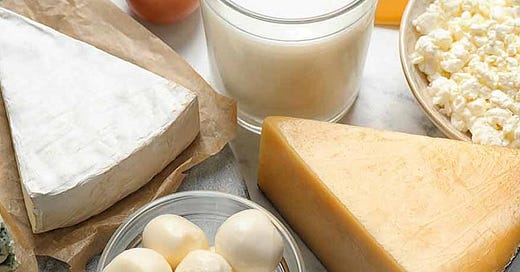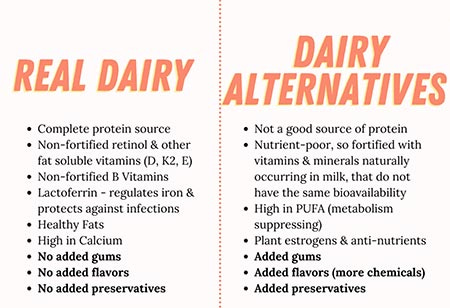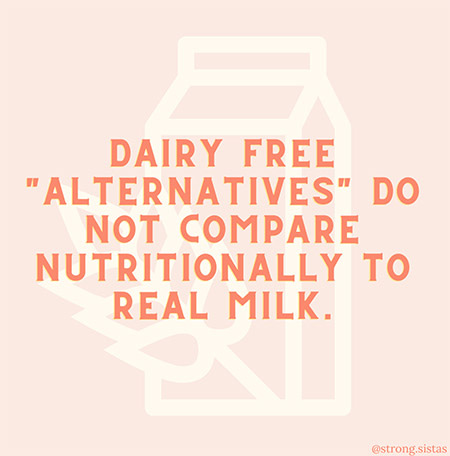The Dairy Truth: Unveiling the Gut Health Benefits of Nature's Perfect Food
Is this push toward plant-based dairy alternatives about health or 'environmental' concerns?
By: Ashley Armstrong
STORY AT-A-GLANCE
Contrary to popular belief, scientific evidence shows that dairy does not increase mucus production or exacerbate respiratory conditions
Dairy products contain milk fat globule membrane (MFGM), which strengthens the gut lining, reduces inflammation, and promotes a healthier microbiome
Raw dairy contains living bacteria that act as natural probiotics, potentially improving digestion and overall gut health. Additionally, lactoferrin, a protein found in dairy, promotes beneficial bacteria growth, maintains gut lining integrity, and helps prevent endotoxins from entering the bloodstream
A2 milk, which lacks the A1 beta-casein protein, is easier to digest for individuals sensitive to conventional dairy
The push towards plant-based dairy alternatives is partly driven by higher profit margins, but these products often lack the nutritional benefits of real dairy
In recent years, dairy has found itself at the center of a nutritional controversy. Once hailed as a dietary staple, it now faces skepticism and misconceptions in some diet camps. But the tide is turning, and science and consumers are rediscovering the incredible benefits of dairy, especially for your gut health. Let's dive into the creamy world of dairy and explore why this ancient superfood can improve microbiome and gut function.
It's worth noting that the recent push towards plant-based dairy alternatives isn't just about health or “environmental” concerns. Big food companies have discovered that these alternatives are often more profitable than traditional dairy products.
Plant-based milks typically have lower production costs, longer shelf lives, and higher profit margins. This financial incentive has led to increased marketing and availability of these products, potentially influencing consumer perceptions about dairy.
However, as we'll explore, the nutritional value of these alternatives often falls short of natural dairy, especially when it comes to gut health. Plant-based dairy alternatives do NOT compare nutritionally to the real deal.
Debunking the Mucus Myth
One of the most persistent myths about dairy is that it increases mucus production. You've probably heard someone say, “I can't drink milk; it makes me phlegmy.” But is there any truth to this claim?
A fascinating Australian study surveyed 345 random shoppers about their views on milk's health qualities. The results were eye-opening:
46% of whole milk drinkers believed milk causes mucus
25% of reduced-fat milk drinkers held this belief
11% of soy milk drinkers agreed with the mucus myth
Even more surprising, 20% of whole milk drinkers, 8% of reduced-fat milk drinkers, and 5% of soy milk drinkers believed milk caused asthma.1 These beliefs aren't limited to Australia. A U.S. study of 330 parents in a pediatric respiratory clinic2 found that:
59% believed drinking milk increases mucus production
22% thought it did not
20% were uncertain
With such widespread beliefs, you might think there must be some truth to the mucus myth. However, there is zero scientific evidence that milk and dairy consumption lead to excess mucus secretion. Multiple studies have debunked this misconception, proving that dairy does not increase mucus production or exacerbate respiratory conditions.3 4
The Plant-Based Pitfall
In recent years, many people have turned to plant-based “milk” alternatives in an attempt to avoid dairy. While these options can be suitable for those with severe dairy allergies, they often come with their own set of problems:
Added seed oils — Many plant-based milk alternatives contain added oils, which can be proinflammatory and potentially harmful to gut health.
Emulsifiers — These additives, used to improve texture and shelf life, have been shown to negatively impact gut health by disrupting the gut microbiome and potentially leading to inflammation.5
When compared to the natural, gut-friendly composition of dairy, many plant-based alternatives fall short in terms of nutritional value and potential health benefits.
Dairy: A 7,000-Year-Old Superfood
Humans have been making and consuming dairy products for over 7,000 years. Our ancestors recognized the value of this nutrient-dense food long before modern nutritional science existed.6 7 8
Cheese, in particular, has played a crucial role in human history. Historians have documented how milk, dairy, and fermented dairy products like cheese served as a storable, calorie-dense food source. This allowed early explorers to travel safely and expand their communities, leading to significant demographic shifts and the development of diverse farming communities.
But why has dairy stood the test of time? The answer lies in its incredible nutritional profile and its positive impact on our gut health.
The Gut-Loving Goodness of Dairy
Let's delve into the science behind dairy's gut health benefits:
Milk fat globule membrane (MFGM) — Milk contains a component called milk fat globule membrane (MFGM), which is a true gut health superhero. Here's what MFGM does for your digestive system:
Strengthens your gut lining
Lowers endotoxemia-associated inflammation
Improves glucose tolerance
Promotes a healthier microbiome environment
These benefits contribute to overall gut health and can help prevent issues like leaky gut syndrome and metabolic disorders.9
Lactoferrin: The gut's guardian — Dairy is rich in lactoferrin, a multifunctional protein that acts as a guardian for your gut. Lactoferrin:
Promotes the growth of beneficial bacteria
Keeps harmful bacteria in check
Helps maintain the integrity of your gut lining10
Binds to endotoxins, preventing them from leaking into your bloodstream and lymph system11
By fostering a balanced gut microbiome and protecting your gut lining, lactoferrin plays a crucial role in maintaining digestive health and supporting your immune system.
Living bacteria: Mother nature's probiotic — While all dairy can be beneficial, raw dairy takes these benefits to the next level. Many people report improved digestion and overall health when consuming raw dairy products. But why is raw dairy so special?
Raw dairy is teeming with living bacteria that provide numerous health benefits.12 It's essentially Mother Nature's probiotic, transferring beneficial microbes directly to your gut microbiome.
While it's a common misconception that raw milk contains the lactase enzyme, it does contain lactobacillus bacteria and other lactase-producing bacteria. These microorganisms significantly aid in lactose digestion, making raw dairy more tolerable for many people who struggle with lactose intolerance.
Raw dairy also contains butyrate-producing bacteria, which can increase the concentration of these beneficial microbes in our guts.13
Butyrate is a short-chain fatty acid that serves as the primary energy source for the cells lining our gut (colonocytes), improving the function of tight junctions and regulating mucosal layer thickness, which all make for a healthy, non-leaky gut.
Raw dairy is also rich in digestive enzymes like peptidases, lipases, and proteases. These enzymes can aid in the breakdown of dairy proteins and fats, potentially making raw dairy easier to digest for some individuals.
It's important to note that the benefits of raw dairy are partly due to the higher quality of the product. Farmers producing raw dairy for consumption must maintain stringent quality standards to ensure safety, resulting in a superior product.
When it comes to raw dairy, safety is a common concern — which is valid, you should know where your food is coming from! However, it's important to put the risks in perspective. According to realmilk.com, you are 35,000 times more likely to get sick from other foods than you are from raw milk.14
That being said, it's crucial to source raw dairy from a farmer you trust. Never source raw dairy from a Concentrated Animal Feeding Operation (CAFO). These large-scale operations with thousands of cows simply cannot produce raw milk safely!
Remember, raw dairy has been consumed for millennia before the invention of pasteurization. With proper sourcing and handling, it can be a safe and incredibly nutritious addition to your diet.
The A2 Advantage
Dairy sourcing can play a huge role in determining an individual's tolerance to dairy products. Many people who experience discomfort with conventional dairy find that they can better tolerate milk, cheese, and other dairy products from specific sources.
For instance, A2 milk, which comes from cows that produce only A2 beta-casein protein, is often easier to digest for those sensitive to A1 protein. A2 casein is the original form of beta-casein that cows produced before a genetic mutation occurred thousands of years ago. Some studies suggest that A2 milk may be easier to digest and less likely to cause gastrointestinal discomfort compared to A1 milk.
If you've had trouble with dairy in the past, trying A2 milk or dairy products might be worth a shot! Similarly, raw milk or dairy from grass fed cows may be more easily tolerated due to their different enzymatic profiles and nutrient content. Goat and sheep milk products are also frequently better tolerated than cow's milk due to their unique protein structures and fat compositions.
The processing method, such as fermentation in yogurt or cheese-making, can also enhance digestibility. By exploring various dairy sources, individuals may discover options that allow them to enjoy dairy without the typical adverse reactions.
Conclusion: Embracing Dairy for Gut Health
As we've explored, dairy is far more than just a calcium source — it's a complex, nutrient-dense food that can significantly benefit your gut health. From the MFGM and lactoferrin in all dairy to the living bacteria and enzymes in raw dairy, these products offer a wealth of gut-friendly compounds.
While it's important to choose high-quality sources and listen to your body's individual needs, don't let unfounded myths scare you away from this nutritional powerhouse. Whether you opt for traditional dairy, raw dairy, or A2 products, you're tapping into a food source that has nourished humans for thousands of years.
So, the next time you pour a glass of milk, spread some butter on your toast, or indulge in a piece of raw cheese, remember — you're not just enjoying a tasty treat. You're providing your gut with a feast of beneficial compounds that support your overall health and well-being.
About the Author
Ashley Armstrong is the co-founder of Angel Acres Egg Co., which specializes in low-PUFA (polyunsaturated fat) eggs that are shipped to all 50 states (join waitlist here), and Nourish Cooperative, which ships low-PUFA pork, beef, cheese, A2 dairy and traditional sourdough to all 50 states. Waitlists will reopen shortly.
Disclaimer: The entire contents of this website are based upon the opinions of Dr. Mercola, unless otherwise noted. Individual articles are based upon the opinions of the respective author, who retains copyright as marked.
The information on this website is not intended to replace a one-on-one relationship with a qualified health care professional and is not intended as medical advice. It is intended as a sharing of knowledge and information from the research and experience of Dr. Mercola and his community. Dr. Mercola encourages you to make your own health care decisions based upon your research and in partnership with a qualified health care professional. The subscription fee being requested is for access to the articles and information posted on this site, and is not being paid for any individual medical advice.
If you are pregnant, nursing, taking medication, or have a medical condition, consult your health care professional before using products based on this content.







I drink raw milk often, and have for 15 years. My body produces mucus within minutes of drinking it more often than not. I find Armstrong’s articles lacking in thoroughness.